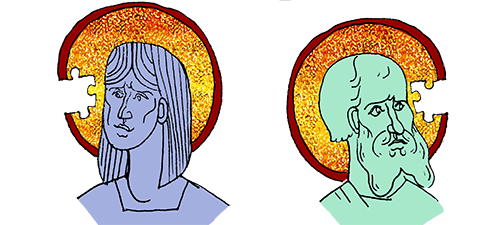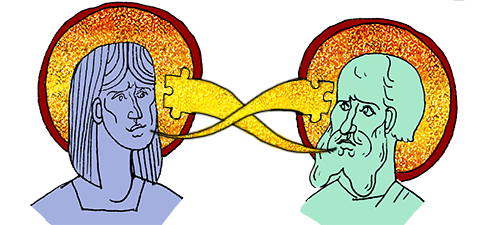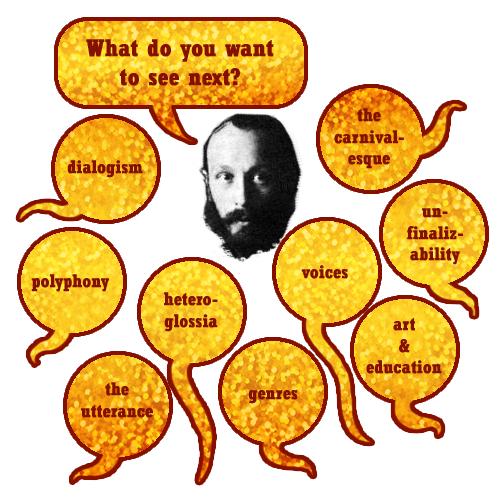

 |
 | |||
|
This procedurally-generated animation is unfinalizable. Unlike a traditional animation, which has a set series of frames with a beginning and an end, or that loop in a repeated cycle, this animation will endlessly generate new frames for itself, frames that its author (me) can't anticipate. Its author has not bounded it in time or imposed a resolution upon it. |
||||
 | ||||
| [F]or Bakhtin, human existence,
like language and meaning, is open-ended, always ‘yet-to-be’. Dialogue reflects and enacts these processes of becoming, whereas monologue (Bakhtin) and
anti-dialogue (Freire) negate it.
(Rule, 2010, p.934) |
||||
 |
 |
 | |||
|
Nothing conclusive has yet taken place in the world, the ultimate word of the world and about the world has yet to be spoken, the world is open and free, everything is still in the future and will always be in the future.
(Bakhtin, 1963/1984, p. 166) The hero of "Notes from Underground" is the first hero-ideologist in Dostoevsky's work. One of his basic ideas, which he advances in his polemic with the socialists, is precisely the idea that man is not a final and defined quantity upon which firm calculations can be made; man is free, and can therefore violate any regulating norms which might be thrust upon him. (Bakhtin, 1963/1984, p. 59) |
||||
 | ||||
 I must engage in a constant dialogue with the world as it is given to me; only in this way can I give my own life meaning and value. In 'Author and Hero', Bakhtin suggests that only through such a dialogue can I hope to complete myself in what he calles the 'absolute future of meaning' ('smyslovoe, absolyutnoe budushchee'). As a consciousness addressed by the world beyond my borders I must answer, for I have the 'otvetstvennost' ('responsibility') to do so (the Russian word carries the same capacity for double meaning as the English term, being formed from the word 'otvet', meaning 'an answer'). (Roberts, 1994, p.245) 
|
||||
 |

Ayers, W., & Alexander-Tanner, R. (2010). To teach: The journey, in comics. New York, NY: Teachers College Press.
Bakhtin, M. M. (1981). Discourse in the novel (C. Emerson & M. Holquist, Trans.). In M. Holquist (Ed.), The dialogic imagination: Four essays by Mikhail Bakhtin (pp. 259-422). Austin, TX: University of Texas Press. (Original work published 1975).
Bakhtin, M. M. (1981). Epic and Novel (C. Emerson & M. Holquist, Trans.). In M. Holquist (Ed.), The dialogic imagination: Four essays by Mikhail Bakhtin (pp. 3-40). Austin, TX: University of Texas Press. (Original work published 1941).
Bakhtin, M. M. (1981). Forms of time and of the chronotope in the novel (C. Emerson & M. Holquist, Trans.). In M. Holquist (Ed.), The dialogic imagination: Four essays by Mikhail Bakhtin (pp. 84-258). Austin, TX: University of Texas Press. (Original work published 1937).
Bakhtin, M. M. (1984). From Rabelais and his world (H. lswolsky, Trans.). In P. Morris (Ed.), The Bakhtin reader (pp. 195-244). New York, NY: Oxford University Press. (Original work published 1965).
Bakhtin, M. M. (1984). Problems of dostoevsky's poetics. (C. Emerson, Trans.). Minneapolis, MN: University of Minnesota Press. (Original work published in 1963).
Bakhtin, M. M. (1986). From speech genres and other late essays (H. lswolsky, Trans.). In P. Morris (Ed.), The Bakhtin reader (pp. 81-87). New York, NY: Oxford University Press. (Original work published 1976).
Cuenca, A. (2010). Democratic means for democratic ends: The possibilities of Bakhtin's dialogic pedagogy for social studies. The Social Studies, 102(1), 42-48.
Dimitriadis, G., & Kamberelis, G. (2006). Theory for education. New York, NY: Routledge.
Miles, A. P. (2010). Dialogic encounters as art education. Studies in art education: A journal of issues and research 51(4), 375-379.
Roberts, G. (1994). A glossary of key terms. In P. Morris (Ed.), The Bakhtin reader (pp. 245-252). New York, NY: Oxford University Press.
Rule, P. (2011). Bakhtin and Freire: Dialogue, dialectic and boundary learning. Educational philosophy and theory 43(9), 924-942.